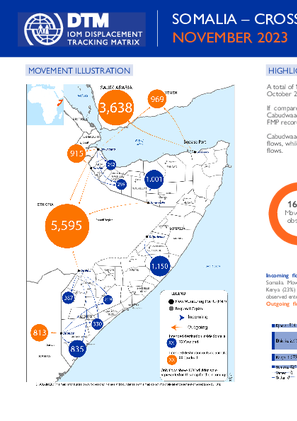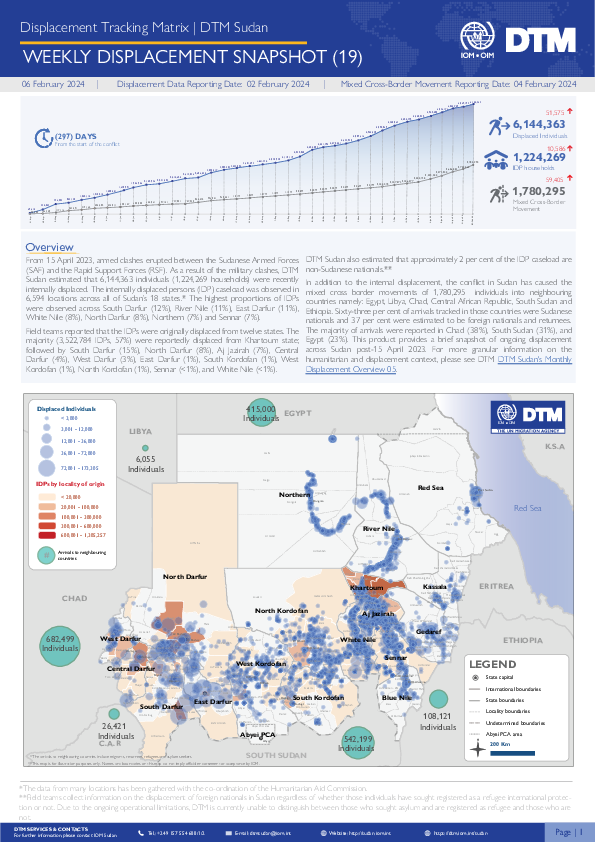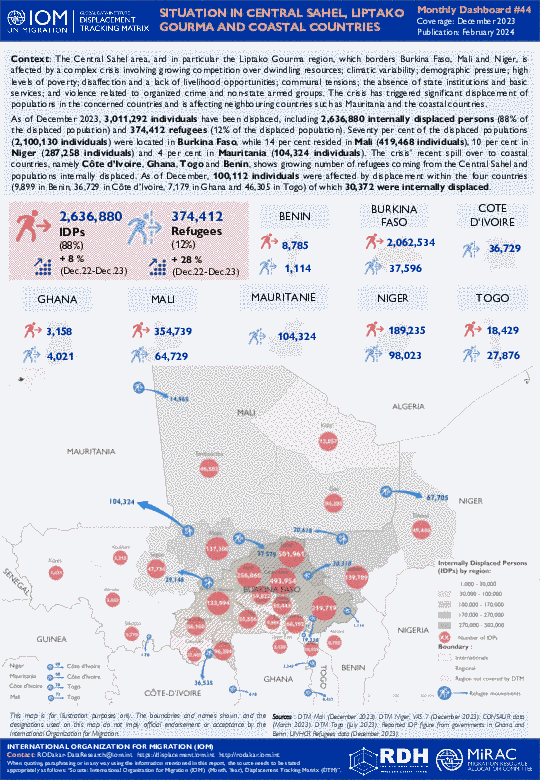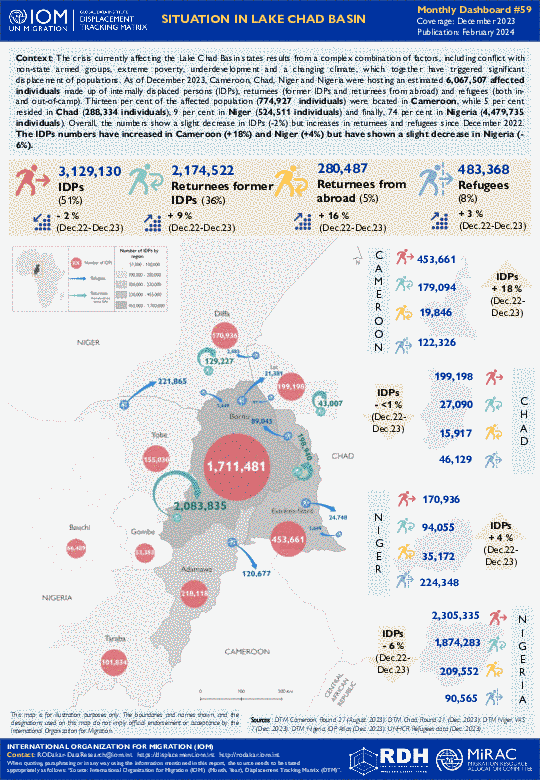-
Countries
-
Data and Analysis
-
Special Focus
-
Crisis Responses

Contact
DTM Somalia, IOMSomaliaDTM@iom.int
Language
English
Location
Somalia
Period Covered
Nov 01 2023
Nov 30 2023
Activity
- Survey
- Flow Monitoring Survey
- Flow Monitoring
A total of 16,614 movements were observed in November 2023, representing a 37% decrease compared to October 2023 when 26,352 movements were observed during this period. If compared with October 2023, Doolow (-60%), Dhobley (-41%), Harirad (-26%), Bossaso (-4%), Cabudwaaq (-4%) and Lowyacado (-3%) FMPs recorded a decrease in movements while Buuhoodle (27%) FMP recorded an increase in movements. Cabudwaaq (25%), Dhobley (23%) and Doolow (17%) FMPs recorded the highest numbers of incoming flows, while Doolow (40%), Bossaso (39%) and Buuhoodle (7%) recorded the highest numbers of outgoing flows.
Contact
dtmlebanon@iom.int
Location
Lebanon
Activity
- Mobility Tracking
- Baseline Assessment
Period Covered
Oct 10 2023 -Jan 30 2024
Since October 8 there has been an increase in cross-border incidents between Israel and Lebanon, resulting in the displacement of people both within the South and elsewhere within the country. Since October 10, the Displacement Tracking Matrix (DTM) has been conducting the daily monitoring of population movements. The objective of the exercise is to inform preparedness and response planning.
Aggregated data is available through the DTM API: https://dtm.iom.int/data-and-analysis/dtm-api
A more detailed version of this dataset is available, to get access kindly click on the 'Request Access' button
Population Groups
IDPs
Survey Methodology
Unit of Analysis Or Observation
Admin Area 2
Admin Area 3
Type of Survey or Assessment
Key Informant
Keywords
Geographical Scope Full Coverage
Administrative boundaries with available data
The current dataset covers the following administrative boundaries
The Central Sahel area, and in particular the Liptako Gourma region, which borders Burkina Faso, Mali and Niger, is affected by a complex crisis involving growing competition over dwindling resources; climatic variability; demographic pressure; high levels of poverty; disaffection and a lack of livelihood opportunities; communal tensions; the absence of state institutions and basic services; and violence related to organized crime and non-state armed groups. The crisis has triggered significant displacement of populations in the concerned countries and is affecting neighbouring countries such as Mauritania and the coastal countries.
As of December 2023, 3,011,292 individuals have been displaced, including 2,636,880 internally displaced persons (88% of the displaced population) and 374,412 refugees (12% of the displaced population). Seventy per cent of the displaced populations (2,100,130 individuals) were located in Burkina Faso, while 14 per cent resided in Mali (419,468 individuals), 10 per cent in Niger (287,258 individuals) and 4 per cent in Mauritania (104,324 individuals). The crisis’ recent spill over to coastal countries, namely Côte d’Ivoire, Ghana, Togo and Benin, shows growing number of refugees coming from the Central Sahel and populations internally displaced. As of December, 100,112 individuals were affected by displacement within the four countries (9,899 in Benin, 36,729 in Côte d’Ivoire, 7,179 in Ghana and 46,305 in Togo) of which 30,372 were internally displaced.
The crisis currently affecting the Lake Chad Basin states results from a complex combination of factors, including conflict with non-state armed groups, extreme poverty, underdevelopment and a changing climate, which together have triggered significant displacement of populations.
As of December 2023, Cameroon, Chad, Niger and Nigeria were hosting an estimated 6,067,507 affected individuals made up of internally displaced persons (IDPs), returnees (former IDPs and returnees from abroad) and refugees (both in- and out-of-camp). Thirteen per cent of the affected population (774,927 individuals) were located in Cameroon, while 5 per cent resided in Chad (288,334 individuals), 9 per cent in Niger (524,511 individuals) and finally, 74 per cent in Nigeria (4,479,735 individuals). Overall, the numbers show a slight decrease in IDPs (-2%) but increases in returnees and refugees since December 2022. The IDPs numbers have increased in Cameroon (+18%) and Niger (+4%) but have shown a slight decrease in Nigeria (-6%).

Contact
DTMMozambique@iom.int
Language
English
Location
Mozambique
Period Covered
Jan 22 2024
Feb 05 2024
Activity
- Mobility Tracking
- Event Tracking
A second wave of attacks in northern Cabo Delgado (22 of January to 05 of February 2024) has triggered the displacement of 3,726 individuals (cumulating 9,069 from 26 of December 2023 to 05 of February 2024), affecting villages across Mocimboa da Praia, Muidumbe, Mecufi, and Macomia. DTM monitoring teams provide below cumulative figures as an update to previous Movement Alerts published (Movement Alert 92 and Movement Alert 93). Of the total individuals displaced, 132 families with 426 individuals have taken refuge in displacement centers of Mueda (Imbuhu, Mpeme, and Centro Eduardo Mondlane), 119 families with 415 individuals have taken refuge in displacement centers of Macomia (Nanga A and Nanga B), and 19 families with 69 individuals have taken refuge in displacement centers of Metuge (Naminaue).

Contact
DTM Sudan; dtmsudan@iom.int
Language
English
Location
Sudan
Period Covered
Jan 26 2024
Feb 02 2024
Activity
- Mobility Tracking
- Baseline Assessment
Overview
From 15 April 2023, armed clashes erupted between the Sudanese Armed Forces (SAF) and the Rapid Support Forces (RSF) in multiple cities across Sudan. Clashes initially took place in cities across Northern and Khartoum states, later spreading across the Darfur and Kordofan regions.
Highlights
- DTM Sudan estimates that 6,144,363 (1,224,269 Households) were recently internally displaced.
- The IDP caseload was observed in 6,594 locations across all of Sudan’s 18 states.
- The highest proportions of IDPs were observed across South Darfur (12%), River Nile (11%), East Darfur (11%), White Nile (8%), North Darfur (8%), Northern (7%), and Sennar (7%).
- Field teams reported that the IDPs observed were originally displaced from twelve states. The majority (3,522,784 IDPs, 57%) were reportedly displaced from Khartoum state; followed by South Darfur (15%), North Darfur (8%), Aj Jazirah (7%), Central Darfur (4%), West Darfur (3%), East Darfur (1%), South Kordofan (1%), West Kordofan (<1%), North Kordofan (<1%), Sennar (<1%), and White Nile (<1%).
- IOM-DTM also reported that an estimated 1,780,295 mixed cross-border movements were made into neighbouring countries.
- This product provides brief insights into those displaced in Sudan post-15 April 2023. For more granular information on the IDP caseload and the displacement context, please see IOM-DTM's Monthly Displacement Overview (05).
Feb 07 2024
Print
Duty Station
Islamabad, Pakistan
Number of positions
1
Starting Date
2024-01-25
Type
Consultant
Closing Date
2024-02-11
Status
Open
Duration
Six months (extendable)
Project Context and Scope:
Established in 1951, IOM is the leading inter-governmental organization in the field of migration and works closely with governmental, intergovernmental and non-governmental partners. IOM is dedicated to promoting humane and orderly migration for the benefit of all. It does so by providing services and advice to governments and migrants.
The Displacement Tracking Matrix (DTM) is a system to track and monitor displacement and population mobility, and is designed to regularly and systematically capture, process and disseminate information providing a better understanding of the movements and evolving needs of displaced populations, whether on-site or enroute. In recent years DTM has become increasingly recognized as the primary source of displacement and migration data and information sources at country, regional and global levels. As a result of its worldwide presence, flexibility, and interoperability, DTM is now being implemented in Pakistan.
Organizational Department / Unit to which the Consultant is contributing:
The Consultant will be contributing to IOM’s Displacement Tracking Matrix (DTM) programme. One of the core functions of DTM is data collection targeting various types of mobile populations and communities living with them through various methods such as face-to-face and/or telephonic interviews. Several enumerators and field coordination assistants will be assigned to conduct data collection and coordinate the effort at the field level.
- Category A Consultants: Tasks to be performed under this contract
Under the overall supervision of the Displacement Tracking Matrix (DTM) Programme Manager in IOM Pakistan, the incumbent will be supporting the implementation of the IOM DTM programme in Pakistan, including:
- Support with the implementation of DTM activities in Pakistan including but not limited to; DTM BaselineMobility Assessments, DTM Community Needs Assessments, DTM Flow Monitoring, DTM Thematic Surveys.
- Support with DTM data analysis and reporting, including (but not limited to) the development of DTManalytical reports, dashboards and sitreps.
- Contribute to cross-sectoral and thematic analyses of interest to IOM and partners, including on humanmobility in the context of climate change, migrant protection, vulnerabilities, and needs.
- Actively participate in the process of generating visualizations products such as interactive dashboards,maps, charts, and infographics that show findings, summarized and customized information to present tomanagement, advocacy teams, other organization's departments, donors, and for data quality control.
- Design and develop DTM forms, using KOBO Toolbox and participate in the revision of the tools.
- Support the unit in determining operational feasibility of new software requirements and implementsolutions by determining and designing system specifications, standards, and programming.
- Support the development and implementation of software development Standard Operating Procedures(SOPs) on establishing source control, continuous integration, deployment, and issue tracking.
- Monitor the quality of collected data, provide feedback regarding any inconsistencies, and support datacleaning and analysis as needed.
- Recommend areas for improvements and propose solutions to improve data collection, effectiveness, andefficiency of the methodology and the processes to maximize performance and contextualization of DTMfield activities.
- Support back-up and organization of all data and information sources (hard copy, soft copy).
- Support with the development and implementation of trainings and workshops to DTM staff, enumeratorsand external partners where needed, and this includes sessions on DTM’s methodology and assessmenttools, data processing protocols, data protection principles, definitions etc.
- Ensure the integration of gender perspectives and attention to specific women/girls and children’s rightsissues (vulnerable groups) within all DTM activities.
- Ensure operational implementation compliance with IOM Data Protection Policy, IOM Data GovernancePolicy, IASC Operational Guidance on Data Responsibility in Humanitarian Action, and the ethicalconsideration on humanitarian data operations.
- In coordination with the DTM Programme Manager, liaise with relevant authorities, UN agencies, NGOs,think tanks, government authorities, and other stakeholders on issues relevant to DTM projects. Participatein relevant meetings where assigned.
- Perform other duties such as assigned by the direct supervisor.
Performance indicators for the evaluation of results:
1. Number of reports edited or finalized.
a.Target: 10 reports for 6 months
2. Number of databases maintained and improved for accuracy and completeness.
a.Target: 2 databases for 6 months
3.Number of data collection tools developed.
a. Target: 2 data collection tools developed for 6 months
Education, Experience and/or skills required:
EDUCATION
- Bachelor’s degree from an accredited academic institution, preferably in Public Relation, Social Sciences,or relevant fields
- Master’s degree in relevant subjects is an advantage.
EXPERIENCE
- At least 2 years of relevant working experience.
- Prior experience in coordination of the field teams, preferably for research and data collection.
- Experience with data collection and verification.
- Experience working in the same local context.
- Experience working with local government representatives.
- Prior experience working for UN agency or international organization is an advantage
SKILLS
- The ability to plan and coordinate activities effectively, especially in data collection and analysis.
- Practical experience of how-to multi-task prioritize and work independently.
- Basic data cleaning and verification skills.
- Strong written and verbal communication skills for interaction with various stakeholders anddocumentation.
- Ability to work effectively and harmoniously in a team of colleagues of varied cultural and professionalbackgrounds.
- Proven ability to produce quality work accurately and concisely according to set deadlines
TRAVEL REQUIRED
- Travel to Islamabad, Pakistan preferred, with the option for periods of working from home station whilst awaiting visa (renewal).
Competencies
Values
- Inclusion and respect for diversity: respects and promotes individual and cultural differences. Encouragesdiversity and inclusion.
- Integrity and transparency: maintains high ethical standards and acts in a manner consistent withorganizational principles/rules and standards of conduct.
- Professionalism: demonstrates ability to work in a composed, competent and committed manner andexercises careful judgment in meeting day-to-day challenges.
- Courage: demonstrates willingness to take a stand on issues of importance.
- Empathy: shows compassion for others, makes people feel safe, respected and fairly treated.
Core Competencies – behavioural indicators
- Teamwork: develops and promotes effective collaboration within and across units to achieve shared goalsand optimize results.
- Delivering results: produces and delivers quality results in a service-oriented and timely manner. Is actionoriented and committed to achieving agreed outcomes.
- Managing and sharing knowledge: continuously seeks to learn, share knowledge and innovate.
- Accountability: takes ownership for achieving the Organization’s priorities and assumes responsibility forown actions and delegated work.
- Communication: encourages and contributes to clear and open communication. Explains complex mattersin an informative, inspiring and motivational way.
SUBMISSION OF PROPOSALS
Method of Application:
Interested Candidates are invited to submit your application by 11th February 2024 through e-mail to: IOMIslamabadrecruitment@iom.int mentioning the “Call for Applications, IM and Reporting Consultant” in subject line. Please keep the attachment size under 9 MB.
The application should be written in English. Applications should include:
- Cover letter
- Curriculum vitae
Other:
The appointment is subject to funding confirmation. Appointment will be subject to certification that the candidate is medically fit for appointment, accreditation, any residency or visa requirements, and security clearances. No late applications will be accepted.

Contact
DTM DRC, iomdrcdtm@iom.int
Language
English
Location
Democratic Republic of the Congo
Period Covered
Dec 19 2023
Jan 27 2024
Activity
- Mobility Tracking
- Event Tracking
Since 2022, the eastern region of the Democratic Republic of the Congo (DRC), in particular North Kivu, has been gripped by a devastating conflict that has intensified and become increasingly complex over time, with the potential to reach unprecedented levels in the province. This crisis is characterised by an abundance of armed actors in the conflict, a large-scale displacement and an increasing number of population in need of humanitarian aid.
The ongoing conflict between the M23 rebel group and the Forces Armées de la République Démocratique du Congo (FARDC) and their allies has been a major source of violence and instability in the region. The situation has deteriorated further since the withdrawal of several East African Community (EAC) force bases from the affected territories. This conflict has not only caused the loss of human life and the displacement of millions of people but has also hampered efforts to establish peace and stability in the region. Since the beginning of the crisis, IOM, through its Displacement Tracking Matrix (DTM) has continued conducting a series of rapid assessments, including emergency monitoring (EET/ERM), crisis analysis and registration, with the aim of responding to immediate information needs in order to understand displacement dynamics. This report presents the results of assessments carried out in the various displacement and return areas between 19 December 2023 and 27 January 2024.

Contact
DTM DRC, iomdrcdtm@iom.int
Language
French
Location
Democratic Republic of the Congo
Period Covered
Dec 19 2023
Jan 27 2024
Activity
- Mobility Tracking
- Event Tracking
Depuis 2022, la région orientale de la République démocratique du Congo (RDC), en particulier le Nord-Kivu, est en proie à un conflit dévastateur qui s'est intensifié et est devenu de plus en plus complexe au fil du temps, avec le potentiel d'atteindre des niveaux sans précédent dans le Nord-Kivu. Cette crise se caractérise par une multitude d'acteurs armés en conflit, une importante population déplacée et une population encore plus importante en manque d'aide humanitaire. Le conflit actuel entre le groupe rebelle M23 et les Forces armées de la République démocratique du Congo (FARDC) et leurs alliés a été une source majeure de violence et d'instabilité dans la région. La situation s'est encore détériorée depuis le début du retrait de plusieurs bases des forces de la Communauté de l'Afrique de l'Est (CAE) des territoires affectés. Ce conflit a non seulement causé la perte de vies humaines et le déplacement de millions de personnes, mais il a également entravé les efforts visant à instaurer la paix et la stabilité dans la région.
Depuis le début de la crise, l'OIM, par le biais de la DTM continue à mener une série d'évaluations rapides, y compris le suivi des urgences (EET/ERM), l'analyse des crises et enregistrement avec priorité de répondre aux besoins immédiats d'information en vue de comprendre la dynamique des déplacements et les besoins. Ce rapport présente les résultats des évaluations menées dans les différentes zones de déplacement et de retour du 19 décembre 2023 au 27 janvier 2024.

Contact
RDH Asia and the Pacific Support - rdhroapsupport@iom.int
Language
English
Location
Afghanistan
Period Covered
Aug 15 2021
Aug 15 2023
Activity
- Flow Monitoring
From when the reporting period started to where it ends, (15 August 2021 to 15 August 2023), the gap between total outflows and inflows has dwindled between Afghanistan and two of its neighbouring countries, that is the Islamic Republic of Iran and Pakistan.
By the second half of the reporting period, cross-border movements reached close to a 1 to1 ratio between outflows (4,307,755) and inflows (4,314,442).
Changes in these flows across this two year period may be more generally attributed to the combination of tighter governmental controls on border crossings, temporary border closures, and fear of deportations of Afghan nationals living abroad. The following sections point to notable peaks and downturns in mobility flows to help put into perspective the timeline and context in which IOM operates in.


